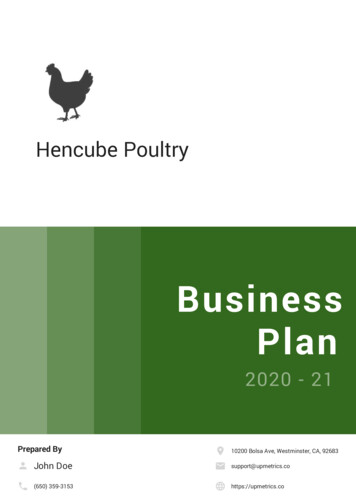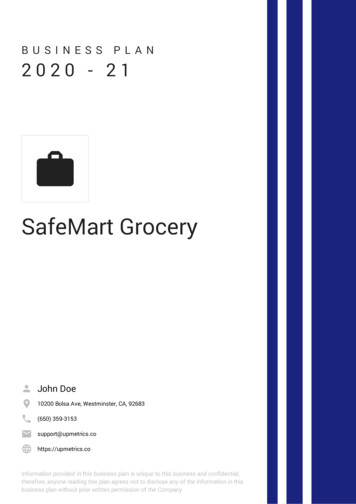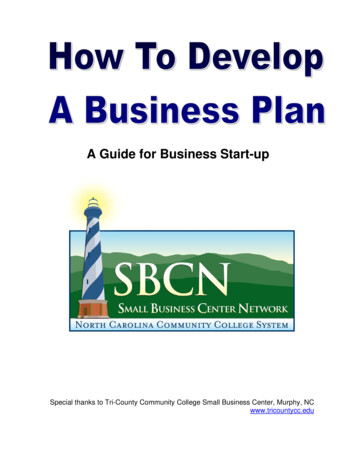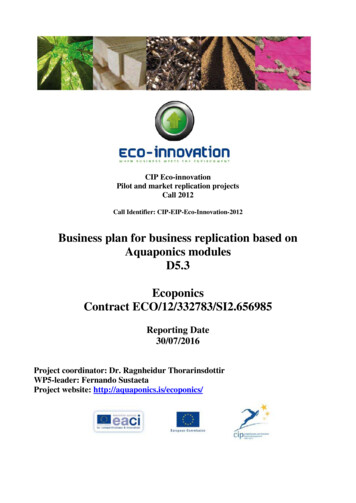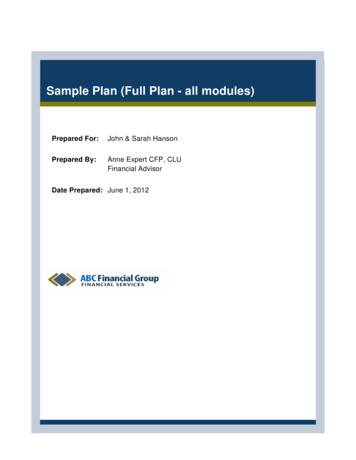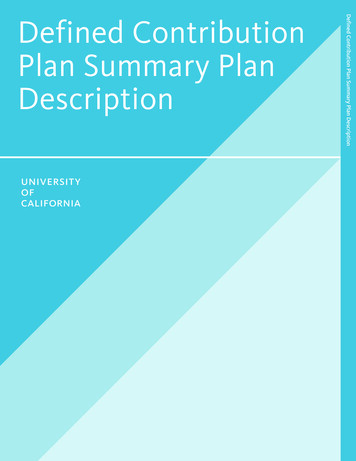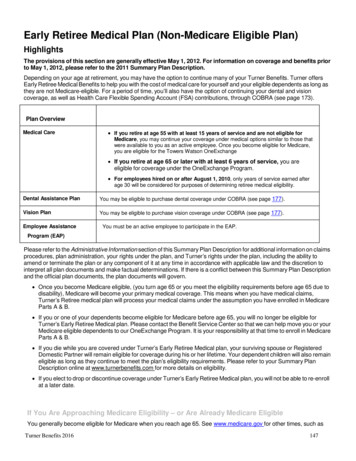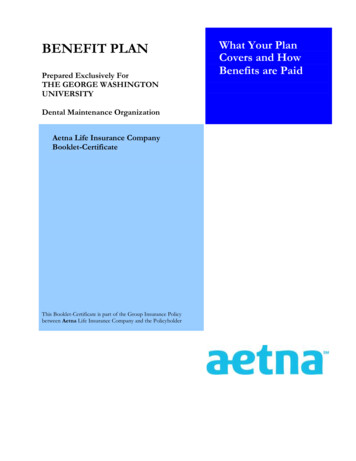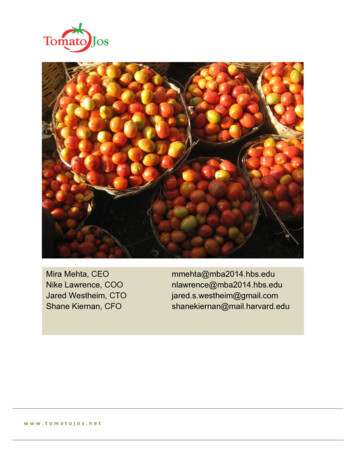
Transcription
Mira Mehta, CEONike Lawrence, COOJared Westheim, CTOShane Kiernan, ernan@mail.harvard.edu
Table of Contents1. Executive Summary . 11.1.1.2.1.3.1.4.1.5.1.6.1.7.1.8.1.9.The Problem . 1The Opportunity . 1Mission . 1Value proposition . 1Theory of change . 2Solution . 2Social Return on Investment . 2Financials . 3Management Team. 32. Introduction . 43. Operational Summary . 53.1.3.2.3.3.3.4.3.5.Organizational Structure . 5Value Proposition. 5Business Model . 5Profit formula (Unit Economics) . 10Measuring results . 104. Market Analysis . 124.1.4.2.4.3.Industry analysis. 12Our competitive edge. 14Risk Analysis . 155. Strategy for Growth . 176. Management Summary . 186.1.6.2.6.3.Management team . 18Advisors . 19Personnel Plan . 207. Financial Plan . 207.1.7.2.7.3.7.4.7.5.7.6.Revenues . 20Expenses . 21Net surplus . 21Quarterly statement of income . 22Annual cash flow statement . 22Capital Requirements . 228. Appendices . 238.1. Farmer contract . 238.2. Indicative workplan . 248.3. Map of Nigeria . 248.4. Financials projections and assumptions . 1Sources . 12
1.Executive Summary1.1.The ProblemNigeria is simultaneously the world’s 13th largest tomato producer and the world’slargest importer of tomato paste. Although approximately 200,000 Nigerian farmers growover 1.5 million metric tonnes of tomatoes every year, half of their harvest is lost beforereaching the market, and the remaining 50% is subject to significant downward pressureon price due to common gluts in the markets and the perishable nature of the crop.Farmers, who are among Nigeria’s most financially vulnerable population, bear theburden of both these post-harvest losses and this price uncertainty. Smallholder tomatofarmers lack access to a consistent, large market for their produce, rendering themunable to consistently make a profit and dis-incentivized to increase their yields orchange their farming practices. As a result, domestic supply cannot meet local demandfor fresh tomatoes, which exceeds 2 million metric tonnes or 2.5 billion annually. Thecountry supplements local demand for fresh tomatoes with 360 million (over 300,000metric tonnes) of imported tomato paste annually.Nigeria is the most populous country in Africa and the seventh most populous in theworld – its population is expected to grow from 170 million today to over 440 million by2050. This has grave implications for the country’s food security situation, given that it isheavily dependent on food imports. If global food prices were to spike and drive up theprice of imports, as they did in 2007-2008, Nigeria would struggle to feed its population.1.2.The OpportunityA well-located, commercial tomato processing operation focused on continuousproduction rather than absorbing seasonal harvest gluts can increase incomes over fivetimes for participating smallholder farmers, who comprise 75% of Nigeria’s workforce.The Nigerian Federal Ministry of Agriculture and Rural Development has made acommitment to improve farm-to-processor links in the tomato value chain, but nobusiness has yet developed a viable, sustainable model to competitively aggregate,process, package and sell tomato paste domestically. Our model links farmers directly topaste production, simultaneously reducing poverty for small holder farmers, who areamong the country’s most vulnerable population, and decreasing Nigeria’s dependenceon an imported food product that is a dietary staple in Nigerian cuisine1.3.MissionTomato Jos is an agricultural production company that believes in the power of farmingand processing local food products for local consumption. Our mission is to make tomatoproduction a sustainable, profitable business forNigerian farmers.1.4.Value propositionValue to farmers: we give farmers the tools andthe incentive to sell a greater proportion of anincreased tomato yield at a consistent, fair price.Value to consumers: we provide consumerswith access to domestic tomato paste that1
matches the quality of imported products at a lower cost.1.5.Theory of changeIf we can connect Nigerian farmers to domestic consumers of processed tomatoproducts, we will improve the lives and incomes of smallholder farmers, provide morenon-farming job opportunities for the increasingly urban population, and increase thestability and sustainability of the food supply in Nigeria.1.6.SolutionSubstantially improving the livelihood of smallholder tomato farmers requires movingmultiple metrics simultaneously. Farmers must be able to sell more of their product, byincreasing yields and reducing post-harvest losses; they must be able to capture agreater amount of the value of their harvest; and they must be less vulnerable toseasonal price fluctuations. To make this possible, Tomato Jos embeds farmers’production within a supportive, self-contained agribusiness ecosystem focused on localproduction, processing, distribution, and farming practice improvement.At scale, Tomato Jos will operate three business lines: (1) Farm and agricultural centerwith farmer education and bundled inputs to help smallholder farmers grow and harvestcrops more efficiently;; (2) Logistics and supply chain support to navigate the “last mile”to smallholder farms and safely bring produce to the processing facility; and (3) Foodprocessing and packaging facility that prepares finished goods for distribution in Nigeria.As the business attains profitability, Tomato Jos will consider options to reinvest aportion of profits into expanded agricultural support programs for farmers in thesurrounding community. Through investment in the community, we hope to further alignfarmer outcomes with the success of our venture and improve the lives of smallholderfarmers and the competitive landscape for local agriculture, translating into future returnsfor the business.1.7.Social Return on InvestmentTomato Jos will have a large positive impact on Nigeria’s agribusiness sector, the socialfabric, and overall economy by ultimately achieving the following: Increase revenues from tomato sales five times for participating smallholder farmersby year five. Create a demonstration farm that actively spreads agricultural best practices to thesurrounding community. Provide a consistent market for approximately 1,000 farmers within our network byyear five.2
Link farmers to markets and strengthen value chains through logistics systems thatare able to navigate the “last mile” to smallholder farms.Improve access to the appropriate quantities of fair-priced inputs such as fertilizersand high-yielding seeds through bundling and pooled procurement.Reduce financial risk from volatile crop prices by offering forward purchasingagreements.1.8.FinancialsTomato Jos follows a low margin, high volume base of the pyramid model where profit isdriven by both scale and technological innovation to control costs. We project thatTomato Jos will become profitable within three years of launch following investmentfocused on expanding the farmer network, our nucleus farm and expanding tomatopaste processing capacity. Over this period we anticipate that Tomato Jos will undergotwo key capital raises: a 500,000 in seed equity in the first quarter of year two to fundour Nigerian nucleus farm expansion, launch the Dami system and begin processingtomato paste. Following the successful scale-up a 3,000,000 growth equity subscriptionin quarter one of year four is required to fund expansion of the business model. OnceTomato Jos reaches scale we believe that profit margins will approach 15%.1.9.Management TeamOur four founding members have over 10 years of combined work experience in Africa,with professional and educational backgrounds that span agribusiness, logistics andsupply chain management, consulting, finance, marketing and business development,investment management and nonprofits.Mira Mehta, CEO: Two years’ investment management experience, four years at ClintonHealth Access Initiative (CHAI) solving HIV-related operational and supply chainproblems in Nigeria.Nike Lawrence, COO: Five years’ investment banking research, one year at AcumenFund building agriculture and healthcare pipelines and portfolios in Liberia, Sierra Leone,and Ghana.Shane Kiernan, CFO: Three years’ investment banking / management experience, twoyears at CHAI assisting national governments to secure financial resources for nationalhealth systems.
www.tomatojos.net Mira Mehta, CEO mmehta@mba2014.hbs.edu Nike Lawrence, COO nlawrence@mba2014.hbs.edu Jared Westheim, CTO jared.s.westheim@gmail.comFile Size: 2MBPage Count: 29
